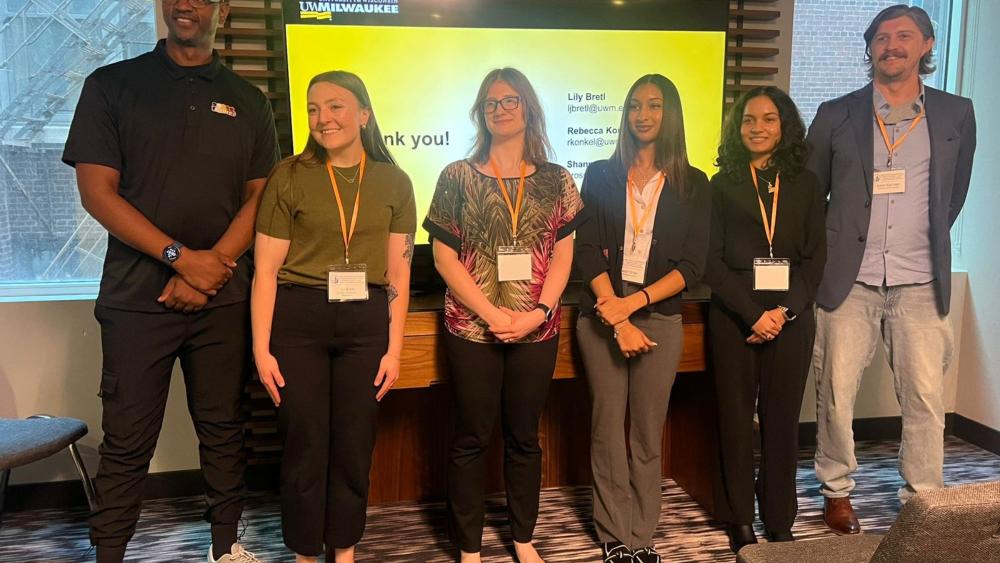From research to impact: “Gender equality is not only a human rights issue; it is a security indicator” – UN Women Europe and Central Asia

Report on Gender Perspectives in Moldovan Security and Defense Strategy
Introduction: Advancing Sustainable Development Goals through Inclusive Security
This report analyzes the contributions of Dr. Natalia Albu, Associate Professor at the ‘Alexandru cel Bun’ Military Academy, to the integration of gender perspectives within the Republic of Moldova’s security and defense sectors. Dr. Albu’s work is instrumental in advancing Sustainable Development Goal 5 (Gender Equality) and Sustainable Development Goal 16 (Peace, Justice and Strong Institutions) by championing the Women, Peace, and Security (WPS) agenda. Her efforts in developing key national strategies underscore the direct correlation between gender equality, institutional strength, and sustainable peace.
The Imperative of a Gender Perspective in Security Policy
Aligning Security with SDG 5 and SDG 16
Dr. Albu’s research was motivated by the observation that security policy is often treated as gender-neutral, a practice that overlooks the distinct security needs and experiences of men and women. This oversight creates significant blind spots in policy design and peacebuilding efforts. Integrating a gender perspective is critical for creating effective and relevant security strategies that protect all citizens, a core tenet of SDG 16.
- Empirical Evidence: Research indicates that nations with higher levels of gender equality are more peaceful and stable, positioning gender equality not merely as a human rights issue but as a key security indicator.
- Comprehensive Analysis: A gender perspective enables a full-spectrum analysis of societal risks, resources, and resilience, leading to smarter security strategies that support the creation of peaceful and inclusive societies under SDG 16.
- Effective Peacebuilding: The exclusion of women from peace processes results in the loss of critical information regarding community needs and early warning signals, undermining efforts to achieve sustainable peace.
Strengthening National Institutions through Women’s Participation
Achieving SDG 16 through Gender-Inclusive Governance
The increased participation of women in leadership and decision-making roles directly contributes to the strengthening of state institutions, a primary target of SDG 16. The case of Moldova demonstrates a positive correlation between increased female political representation and improved national performance on key governance metrics.
- Improved Governance Indices: As Moldova adopted gender-sensitive reforms and saw a rise in women’s political representation, the country recorded improved scores on the Democracy Index, Rule of Law Index, and Corruption Perception Index.
- Legislative Progress: The increased presence of women in decision-making roles was a driving factor behind Moldova’s ratification of the Istanbul Convention in 2022, a landmark achievement for human rights and gender equality (SDG 5).
Systemic Reforms to Promote Women in Security Leadership
Addressing Barriers to Fulfill SDG 5 Targets
Achieving gender equality in security institutions requires addressing deep-seated systemic and cultural barriers. Dr. Albu identifies that obstacles to women’s leadership are not individual but institutional, necessitating a dual approach of structural and cultural transformation to meet the objectives of SDG 5.
Key Areas for Reform:
- Structural Change:
- Implement transparent and merit-based promotion processes.
- Establish dedicated leadership development programs for women.
- Create gender-sensitive human rights systems with accountability mechanisms for discrimination and harassment.
- Cultural Transformation:
- Shift away from traditional “masculine leadership” models that prioritize hierarchy and physical strength.
- Promote modern leadership qualities essential for addressing contemporary threats like hybrid warfare and disinformation, including emotional intelligence, negotiation, and strategic communication.
- Recognize diversity as a strategic asset that improves institutional performance and effectiveness.
The Strategic Necessity of the WPS Agenda for Moldova
Leveraging WPS for National Resilience and EU Integration
For Moldova, the WPS agenda is a strategic imperative for navigating a complex security environment and advancing its European integration goals. The agenda provides a framework for building resilient, democratic, and transparent institutions capable of protecting all citizens, directly supporting the aims of SDG 16.
- Comprehensive Security: The WPS agenda offers a holistic approach to security that addresses modern threats such as hybrid warfare, disinformation, and social polarization, which cannot be countered by military responses alone.
- Alignment with EU Accession: Implementing the WPS agenda supports the institutional transformations required for EU accession, including the protection of human rights, gender equality, and the rule of law, all of which are central to SDG 16.
Recommendations for an Effective National Action Plan (NAP)
A Results-Oriented Approach for SDG 16 and SDG 17
To ensure future NAPs on UNSCR 1325 have a tangible impact, a more strategic, localized, and results-oriented approach is required. Lessons from previous NAPs indicate that success depends on clear objectives, dedicated resources, and national ownership. This approach aligns with SDG 16‘s call for effective, accountable, and transparent institutions and SDG 17 (Partnerships for the Goals) through enhanced cooperation.
Recommendations for the Next NAP:
- Clarity and Accountability: Every objective must be linked to concrete indicators, clearly assigned institutional responsibilities, and dedicated financial resources.
- National Ownership: The WPS agenda must be integrated into core national processes, including defense reform and EU accession, rather than being treated as a donor-driven project.
- Capacity Building: Invest in training and empowering gender advisers within the decision-making chain and foster leadership that understands inclusive security is more effective security.
- Enhanced Partnerships: Strengthen cooperation between government institutions, civil society, and international partners to ensure a coordinated and effective implementation, in line with SDG 17.
SDGs Addressed in the Article
The following Sustainable Development Goals (SDGs) are connected to the issues discussed in the article:
-
SDG 5: Gender Equality
- The entire article is centered on achieving gender equality within the security and defense sectors. Natalia Albu’s work focuses on integrating a gender perspective into security research and policy, advocating for women’s leadership, and dismantling systemic barriers. She states, “Gender equality is not only a human rights issue; it is a security indicator,” directly linking the goal to the core theme of peace and security. The discussion revolves around the implementation of the Women, Peace and Security (WPS) agenda, which is a key framework for advancing gender equality in conflict and post-conflict settings.
-
SDG 16: Peace, Justice and Strong Institutions
- The article strongly connects gender equality with the development of peaceful societies and effective institutions. Albu argues that including women in decision-making strengthens the state, citing improvements in Moldova’s Democracy Index, Rule of Law Index, and Corruption Perception Index as women’s political representation increased. The goal of building “effective, accountable and transparent institutions” is explicitly mentioned through the call for “transparent promotion processes” and “real accountability against discrimination.” The article posits that implementing the WPS agenda helps build “modern, democratic, transparent and resilient security institutions capable of protecting all its citizens.”
Specific SDG Targets Identified
Based on the article’s content, the following specific SDG targets can be identified:
-
Under SDG 5 (Gender Equality):
- Target 5.5: Ensure women’s full and effective participation and equal opportunities for leadership at all levels of decision-making in political, economic and public life.
- The article directly addresses this target by focusing on the need to “bring women into leadership roles in security institutions.” Albu notes that when women are excluded from peace processes, “critical information about community needs, early warning signals and social dynamics is lost.” She advocates for creating spaces where women are “shapers of strategy,” not just participants.
- Target 5.1: End all forms of discrimination against all women and girls everywhere.
- This target is relevant as the article identifies “persistent stereotypes that security is a ‘male domain’” and “rigid institutional cultures” as major obstacles. Albu calls for “real accountability against discrimination or harassment” as a necessary step for structural change within security institutions.
- Target 5.c: Adopt and strengthen sound policies and enforceable legislation for the promotion of gender equality and the empowerment of all women and girls at all levels.
- The development and implementation of Moldova’s National Action Plans (NAPs) for UNSCR 1325 is a direct example of this target in action. Furthermore, the article highlights the ratification of the Istanbul Convention as a significant achievement “driven by the increased presence of women in decision-making,” representing the adoption of enforceable legislation.
- Target 5.5: Ensure women’s full and effective participation and equal opportunities for leadership at all levels of decision-making in political, economic and public life.
-
Under SDG 16 (Peace, Justice and Strong Institutions):
- Target 16.7: Ensure responsive, inclusive, participatory and representative decision-making at all levels.
- The article argues that a gender perspective improves the quality and effectiveness of security strategies by allowing policymakers to “understand the full spectrum of risks, resources and resilience within society.” The call for women to be “shapers of strategy” and the critique of their exclusion from decision-making directly align with the need for inclusive and participatory processes.
- Target 16.6: Develop effective, accountable and transparent institutions at all levels.
- Albu explicitly links women’s participation to institutional strength, stating that as women’s representation increased, “the country improved its scores on the Democracy Index, Rule of Law Index, and Corruption Perception Index.” Her call for the next NAP to have “clearly responsible institutions and dedicated resources” and for the WPS agenda to be integrated into national defense reform underscores the goal of building effective and accountable institutions.
- Target 16.7: Ensure responsive, inclusive, participatory and representative decision-making at all levels.
Indicators for Measuring Progress
The article mentions or implies several indicators that can be used to measure progress towards the identified targets:
-
Proportion of women in leadership and decision-making roles:
- This is implied throughout the discussion on bringing “women into leadership roles in security institutions” and the impact of “the increased presence of women in decision-making.” Measuring the number and proportion of women in senior positions within the military, police, and government would be a direct indicator.
-
National Governance and Rule of Law Indices:
- The article explicitly mentions the “Democracy Index, Rule of Law Index, and Corruption Perception Index” as metrics that improved in Moldova in correlation with increased women’s political representation. These external indices serve as concrete indicators of institutional strength and transparency (Target 16.6).
-
Adoption and Implementation of Gender-Responsive Policies:
- The existence, funding, and monitored implementation of the National Action Plan (NAP) on UNSCR 1325 is a key indicator. The article notes that progress in the second NAP is tracked via an “independent monitoring report” and that a key challenge is “limited national funding,” highlighting both the policy and its resource allocation as measurable points. The ratification of the Istanbul Convention is another concrete legislative indicator.
-
Allocation of dedicated resources:
- The article points to “limited national funding” as a reason for uneven progress. Therefore, the amount of the national budget dedicated to implementing the NAP and other gender equality initiatives is a critical indicator of commitment and progress. The call for the next NAP to have “dedicated resources” reinforces this.
-
Presence of institutional mechanisms:
- The need for “trained gender advisers who are part of the decision-making chain” is mentioned as a way to institutionalize the WPS agenda. The number and influence of such advisers can be an indicator of institutional capacity and commitment.
Summary of Findings
| SDGs | Targets | Indicators Identified in the Article |
|---|---|---|
| SDG 5: Gender Equality | 5.5: Ensure women’s full and effective participation and equal opportunities for leadership at all levels of decision-making. |
|
| SDG 5: Gender Equality | 5.1: End all forms of discrimination against all women and girls everywhere. |
|
| SDG 5: Gender Equality | 5.c: Adopt and strengthen sound policies and enforceable legislation for the promotion of gender equality. |
|
| SDG 16: Peace, Justice and Strong Institutions | 16.7: Ensure responsive, inclusive, participatory and representative decision-making at all levels. |
|
| SDG 16: Peace, Justice and Strong Institutions | 16.6: Develop effective, accountable and transparent institutions at all levels. |
|
Source: eca.unwomen.org
What is Your Reaction?
 Like
0
Like
0
 Dislike
0
Dislike
0
 Love
0
Love
0
 Funny
0
Funny
0
 Angry
0
Angry
0
 Sad
0
Sad
0
 Wow
0
Wow
0














































































